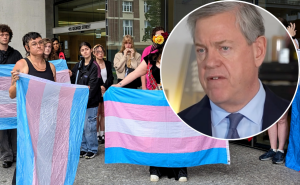
A recent independent evaluation of the Queensland Children’s Gender Service (QCGS) has confirmed that the service operates with no evidence of coercion, malpractice, or inadequate mental health screenings prior to the administration of puberty blockers and other gender-affirming treatments.
This comprehensive review, which lasted six months, was prompted by allegations from Dr. Jillian Spencer, a psychiatrist at Queensland Children’s Hospital, who raised concerns about the adequacy of mental health screenings and the potential harm of gender-affirmation therapies on young patients.
Panel finds Queensland Children’s Gender Service provides safe and effective care
The panel, led by Queensland psychiatrist and associate professor John Allan, found that QCGS provides safe and effective care from referral to discharge, adhering strictly to both national and international guidelines.
The findings highlight that the service’s practices include thorough assessments of mental health, neurodiversity, and life circumstances of the young patients before any medical treatments are considered.
Dr. Allan emphasised the importance of evidence-based, appropriate care tailored to each individual’s situation.
“There’s quite a lot of risks in not giving that person the opportunity to express themselves and find some way that they can move forward,” Dr. Allan told the ABC. “Those can lead to things like anxiety, depression, even suicidal thoughts. There are young people suffering. We need to give them services.”
Despite the controversy surrounding medical interventions for gender dysphoria in youth, the panel found QCGS’s clinical practices consistent with the best available evidence, effectively addressing the needs of its patients.
The review also noted the commendable dedication of the QCGS staff, who, despite facing high demand and public scrutiny, remained focused and committed to patient outcomes.
To further enhance the service, the panel made 25 recommendations, including the creation of a statewide network of regional clinics to provide care closer to home for children and adolescents with diverse gender experiences.
This recommendation aims to alleviate the current burden on the QCGS and address the high demand for its services, which currently has 547 active patients and an additional 491 on the waiting list.
Queensland is home to a proud and vibrant trans and gender diverse community
Acknowledging the findings, Queensland Health Minister Shannon Fentiman welcomed the report and its recommendations.
She announced an additional $2.6 million in annual funding for the QCGS, doubling its budget to $5.2 million.
“Queensland is home to a proud and vibrant trans and gender diverse community, and the Miles government is committed to ensuring that they have access to safe, responsive, contemporary healthcare services,” Fentiman stated.
“Through implementing these recommendations, including by developing a statewide network service model, we will bring down waitlists and ensure young people get the care they need closer to home.”
The review also stressed the importance of better data collection to monitor long-term outcomes for patients, the development of specialised credentialing for doctors working in gender services, and a long-term investment in training, education, and research to increase health worker expertise in gender diversity and dysphoria.
Frank Tracey, Chief Executive of Children’s Health Queensland, expressed gratitude for the evaluation. “The assurance that the Queensland Children’s Gender Service is providing safe and evidence-based person-centred care for trans and gender-diverse children young people is welcomed,” he said. “The panel’s recommendations provide a clear road map for enhancing statewide service delivery into the future.”
The implementation of these recommendations promises to improve access and outcomes for these young individuals, ensuring they receive the support and care they need in a timely and effective manner.



